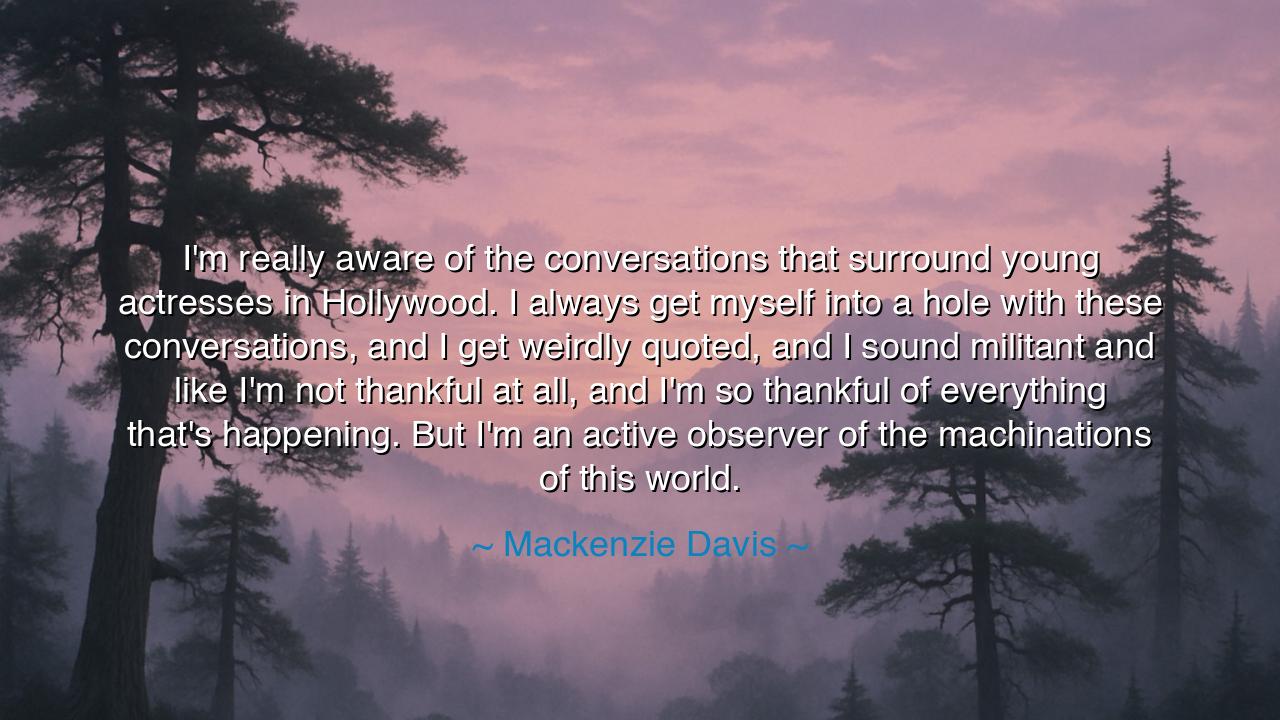
I'm really aware of the conversations that surround young
I'm really aware of the conversations that surround young actresses in Hollywood. I always get myself into a hole with these conversations, and I get weirdly quoted, and I sound militant and like I'm not thankful at all, and I'm so thankful of everything that's happening. But I'm an active observer of the machinations of this world.






When Mackenzie Davis speaks, “I’m really aware of the conversations that surround young actresses in Hollywood. I always get myself into a hole with these conversations, and I get weirdly quoted, and I sound militant and like I’m not thankful at all, and I’m so thankful of everything that’s happening. But I’m an active observer of the machinations of this world,” she reveals the delicate tension of being both participant and critic in a powerful industry. Her words are a confession of humility and complexity: she is thankful for her opportunities, yet unwilling to blind herself to the machinations that shape her world. In her voice, we hear the struggle of those who wish to remain grateful while also speaking truth about the flaws around them.
At the heart of her quote lies the difficulty of perception. She acknowledges how words can be twisted, how speaking openly about injustice or imbalance can lead others to paint her as ungrateful. This is a burden often carried by those who dare to question systems of power: they risk being misunderstood. Yet Davis insists upon her gratitude, even as she names herself an observer — one who sees, reflects, and does not sleepwalk through the illusions of fame. Her honesty is not complaint, but clarity.
This duality recalls the wisdom of ancient voices who lived at the crossroads of privilege and critique. Think of Socrates, who, though a citizen of Athens, did not merely celebrate its greatness but questioned its foundations, often angering those in power. He too was misquoted, misunderstood, and painted as militant, though his aim was truth. In Davis’ words, we hear an echo of this same spirit: a willingness to bear misinterpretation for the sake of insight, while still holding gratitude for the gifts she has received.
Her statement also speaks to the experience of young women in Hollywood, who often find themselves simultaneously exalted and constrained. To be praised as talented yet objectified, to be celebrated yet silenced when speaking against injustice — this paradox is the “hole” Davis describes. Yet rather than surrendering to bitterness, she grounds herself in thankfulness. She honors the work she has been given, while refusing to abandon her responsibility to see and question. Gratitude here does not mean blind acceptance; it means strength to walk between appreciation and awareness.
History offers another mirror in the life of Eleanor Roosevelt. As First Lady, she was given privilege and platform, yet she refused to be merely ornamental. She used her position to challenge systems of inequality, often facing criticism and being labeled radical. Yet she, too, was deeply grateful for the opportunities to serve and to influence change. Davis stands in this tradition of those who balance thankfulness with courage, acknowledging blessings without ignoring brokenness.
For us, the lesson is profound: to live wisely in any system — be it workplace, community, or culture — we must cultivate thankfulness while remaining watchful observers. Gratitude alone can make us complacent; criticism alone can make us bitter. But when held together, they give us balance: the joy to honor what is good, and the courage to confront what is unjust. This is not an easy path, for it invites misunderstanding, yet it is the path of integrity.
Therefore, let this wisdom be passed down: be thankful for the gifts entrusted to you, but do not lose your sight in the glitter of fortune. Remain an active observer, questioning the systems around you, and do not fear being misunderstood if your words are honest. For true gratitude is not silence in the face of brokenness; it is the strength to celebrate blessings while striving for a better world. And as Mackenzie Davis reminds us, to walk this line is to live with both humility and courage — a balance worthy of the ancients.






AAdministratorAdministrator
Welcome, honored guests. Please leave a comment, we will respond soon